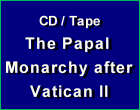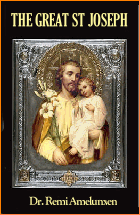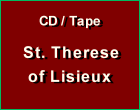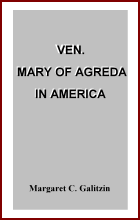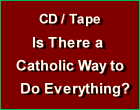Special Devotions
 |
 |
 |
 |
 |
 |
 |
Reflections on Knock - IV
Our Lady of Knock & Our Lady of Lourdes
Some aspects of the apparition of Our Lady of Knock were already analyzed in previous articles (here, here, and here). Today, I will continue these ‘reflections’ by looking at other parallels, this time between Knock and the apparitions of Our Lady of Lourdes.
Our Lady’s Apparition at Lourdes
Beginning on February 11, 1858, in a grotto near Lourdes, France, Our Lady appeared 18 times until the last one on July 16, 1858 to a young peasant girl, Bernadette Soubirous, who would later be canonized. This was 12 years after Our Lady’s Apparition at La Salette and 24 years before her next apparition at Knock. As at Knock and La Salette, Our Lady at Lourdes gave secrets, did not appear to the clergy and did not appear inside any Church structure.
She appeared and spoke only to Bernadette. The message of Our Lady was one of penance and prayer. She told Bernadette to have a basilica built at that site and a miraculous spring of water appeared there, causing many cures of the sick.
Lourdes & Knock: both confirmations of papal declarations
In Rome, in 1854, Pope Pius IX declared the Dogma of the Immaculate Conception. Consequently, when Our Lady at Lourdes said, “I am the Immaculate Conception,” two things could be understood. First, it attested to the veracity of those apparitions since the simple Bernadette knew nothing of the meaning of that theological term. Second, it was a confirmation of that Papal dogma.
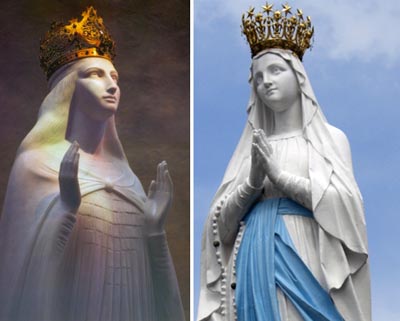 At Knock something analogous happened: It also confirmed a recent papal declaration, as Pius IX had publicly declared St. Joseph as Patron of the Church in 1870 in the decree Quemadmodum Deus. Here are the reasons he gave:
At Knock something analogous happened: It also confirmed a recent papal declaration, as Pius IX had publicly declared St. Joseph as Patron of the Church in 1870 in the decree Quemadmodum Deus. Here are the reasons he gave:
“Because of this sublime dignity which God conferred on His most faithful servant, the Church has always most highly honored and praised Blessed Joseph, next to his Spouse, the Virgin Mother of God, and has besought his intercession in times of trouble.
“And now, therefore, when in these most troublesome times the Church is beset by enemies on every side, and is weighed down by calamities so heavy that ungodly men assert that the gates of Hell have at length prevailed against her, the venerable Prelates of the whole Catholic world have presented to the Sovereign Pontiff their own petitions and those of the faithful committed to their charge, praying that he would deign to constitute St. Joseph Patron of the Church. And this time their prayer and desire was renewed by them even more earnestly at the Sacred Ecumenical Council of the Vatican.
“Accordingly, it has now pleased the Most Holy Sovereign, Pope Pius IX, in order to entrust himself and all the faithful to the Patriarch St. Joseph’s most powerful patronage, has chosen to comply with the Prelates' desire and has solemnly declared him Patron of the Catholic Church…”
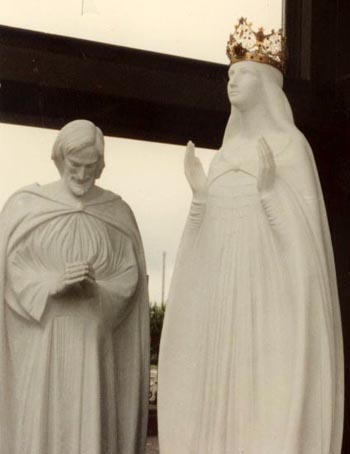 In 1879, nine years after this decree, St. Joseph appeared at Knock. His silent presence there was a confirmation of that papal dedication. He was present there in a position of patron and protector. By the fact that he was turned toward Our Lady with his head slightly inclined, he was telling us that “in these most troublesome times” we should turn to her. So, besides confirming the papal entrustment, he also offered us the best way to find a solution to the difficult situation in the Church.
In 1879, nine years after this decree, St. Joseph appeared at Knock. His silent presence there was a confirmation of that papal dedication. He was present there in a position of patron and protector. By the fact that he was turned toward Our Lady with his head slightly inclined, he was telling us that “in these most troublesome times” we should turn to her. So, besides confirming the papal entrustment, he also offered us the best way to find a solution to the difficult situation in the Church.
This coming Friday, August 21, 2015, is the anniversary of the Apparition of Knock. It is also, very significantly, the eve of the Feast of the Immaculate Heart of Mary. In 1944, August 21 was named the vigil of the Feast of the Immaculate Heart of Mary. It seems that Pope Pius XII placed August 22 on the calendar as the Feast of the Immaculate Heart of Mary in response to the request of Sister Lucia of Fatima.
Today, I pause at this point and in my next article I shall continue the comparisons of Knock and Lourdes. Doing so I make this article shorter because I would like to share with my readers the wonderful testimony given below. Patrick Hill, age 14, gives one of the 15 official testimonies recorded by the Episcopal Knock Commission. It is the longest testimony and I believe the most interesting. With all the curiosity and agility of youth, he explores and describes in detail the Apparition at Knock.
May Our Lady of Knock help all of us during these “times of trouble,” on the 136th anniversary of her apparition.
Our Lady of Knock, Pray for Us;
Our Lady of Lourdes, Pray for Us.
Testimony of Patrick Hill, Witness before the Knock Commission
I am Patrick Hill; I live in Claremorris; my aunt lives at Knock; I remember the 21st August last; on that day I was drawing home turf, or peat, from the bog on an ass.
While I was at my aunt’s at about eight o’clock in the evening, Dominick Byrne came into the house. He cried out: ’Come up to the chapel and see the miraculous lights and the beautiful visions that are to be seen there.’ I followed him; another man by name Dominick Byrne, and John Durkan, and a small boy named John Curry came with me; we were all together; we ran over towards the chapel.
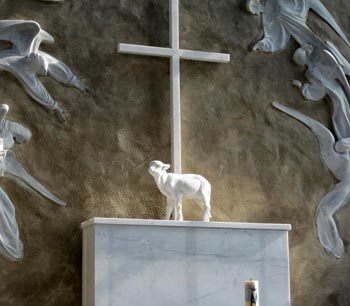 When we, running southwest, came so far from the village that on our turning, the gable came into view, we immediately beheld the lights: a clear white light, covering most of the gable, from the ground up to the window and higher. It was a kind of changing bright light, going sometimes up high and again not so high. We saw the figures – the Blessed Virgin, St. Joseph and St. John, and an altar, with the Lamb on the altar, and a cross behind the Lamb.
When we, running southwest, came so far from the village that on our turning, the gable came into view, we immediately beheld the lights: a clear white light, covering most of the gable, from the ground up to the window and higher. It was a kind of changing bright light, going sometimes up high and again not so high. We saw the figures – the Blessed Virgin, St. Joseph and St. John, and an altar, with the Lamb on the altar, and a cross behind the Lamb.
At this time we reached as far as the wall fronting the gable. There were other people there before me; some of them were praying, some not. All were looking at the vision; they were leaning over the wall or ditch, with their arms resting on the top. I saw the figures and brightness; the boy John Curry, from behind the wall, could not see them, but I did; and he asked me to lift him up till he could see the grand babies, as he called the figures.
It was raining; some – amongst them Mary McLoughlin – who beheld what I now saw, had gone away; others were coming. After we prayed a while I thought it right to go across the wall and into the chapel yard. I brought little Curry with me; I went then up closer; I saw everything distinctly. The figures were full and round, as if they had a body and life; they said nothing, but as we approached, they seemed to go back a little towards the gable.
I distinctly beheld the Blessed Virgin Mary, life size, standing about two feet or so above the ground, clothed in white robes, which were fastened to the neck; her hands were raised to the height of the shoulders, as if in prayer, with the palms facing one another, but slanting inwards towards the face; the palms were not turned towards the people, but facing each other as I have described. She appeared to be praying; her eyes were turned, as I saw, towards heaven.
She wore a brilliant crown on her head and, over the forehead, where the crown fitted the brow, was a beautiful rose. The crown appeared brilliant and of a golden brightness, of a deeper hue, inclined to a mellow yellow, than the striking whiteness of the robes she wore. The upper parts of the crown appeared to be a series of sparkles, or glittering crosses.
I saw her eyes, the balls, the pupils, and the iris of each – [the boy did not know those special names of those parts of the eye, but he pointed to them, and described them in his own way].
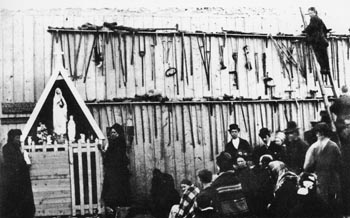 I noticed her hands especially and face; her appearance. The robes came only as far as the ankles; I saw the feet and the ankles; one foot, the right, was slightly in advance of the other.
At times she appeared, and all the figures appeared to move out and again to go backwards. I saw them move; she did not speak. I went up very near; one old woman went up and embraced the Virgin’s feet and she found nothing in her arms or hands; they receded, she said, from her.
I noticed her hands especially and face; her appearance. The robes came only as far as the ankles; I saw the feet and the ankles; one foot, the right, was slightly in advance of the other.
At times she appeared, and all the figures appeared to move out and again to go backwards. I saw them move; she did not speak. I went up very near; one old woman went up and embraced the Virgin’s feet and she found nothing in her arms or hands; they receded, she said, from her.
I saw St. Joseph to the Blessed Virgin’s right hand; his head was bent from the shoulders forward; he appeared to be paying his respects. I noticed his whiskers, they appeared slightly grey. There was a line or dark mearing between the figure of the Blessed Virgin and that of St. Joseph, so that one could know St. Joseph, and the place where his figure appeared distinctly from that of the Blessed Virgin and the spot where she stood. I saw the feet of St. Joseph, too; his hands were joined like a person at prayer.
The third figure that stood before me was that of St. John the Evangelist. He stood erect to the Gospel side of the altar and at an angle with the figure of the Blessed Virgin, so that his back was not turned to the altar nor to the Mother of God. His right arm was at an angle with a line drawn across from St. Joseph to where Our Blessed Lady appeared to be standing.
St. John was dressed like a bishop preaching; he wore a small mitre on his head. He held a Mass book, or a Book of the Gospels, in the left hand; the right hand was raised to the elevation of the head. While he kept the index finger and the middle finger of the right hand raised, the other three fingers of the same hand were shut. He appeared as if he were preaching but I heard no voice; I came so near that I looked into the book; I saw the lines and the letters. St. John wore no sandals.
His left hand was turned towards the altar that was behind him; the altar was a plain one, like any ordinary altar, without any ornaments. On the altar stood a Lamb – the size of a lamb eight weeks old; the face of the Lamb was fronting the west and looking in the direction of the Blessed Virgin and St. Joseph.
Behind the Lamb a large cross was placed erect or perpendicular on the altar. Around the Lamb I saw angels hovering during the whole time, for the space of one hour and a half or longer. I saw their wings fluttering, but I did not perceive their heads or faces, which were not turned to me.
For the space of one hour and a half we were under the pouring rain; at this time I was very wet. I noticed that the rain did not wet the figures which appeared before me, although I was wet myself; I went away then.
Patrick Hill
Continued

Our Lady’s Apparition at Lourdes
Beginning on February 11, 1858, in a grotto near Lourdes, France, Our Lady appeared 18 times until the last one on July 16, 1858 to a young peasant girl, Bernadette Soubirous, who would later be canonized. This was 12 years after Our Lady’s Apparition at La Salette and 24 years before her next apparition at Knock. As at Knock and La Salette, Our Lady at Lourdes gave secrets, did not appear to the clergy and did not appear inside any Church structure.
She appeared and spoke only to Bernadette. The message of Our Lady was one of penance and prayer. She told Bernadette to have a basilica built at that site and a miraculous spring of water appeared there, causing many cures of the sick.
Lourdes & Knock: both confirmations of papal declarations
In Rome, in 1854, Pope Pius IX declared the Dogma of the Immaculate Conception. Consequently, when Our Lady at Lourdes said, “I am the Immaculate Conception,” two things could be understood. First, it attested to the veracity of those apparitions since the simple Bernadette knew nothing of the meaning of that theological term. Second, it was a confirmation of that Papal dogma.

Our Lady at Knock and Lourdes: both confirm papal declarations
“Because of this sublime dignity which God conferred on His most faithful servant, the Church has always most highly honored and praised Blessed Joseph, next to his Spouse, the Virgin Mother of God, and has besought his intercession in times of trouble.
“And now, therefore, when in these most troublesome times the Church is beset by enemies on every side, and is weighed down by calamities so heavy that ungodly men assert that the gates of Hell have at length prevailed against her, the venerable Prelates of the whole Catholic world have presented to the Sovereign Pontiff their own petitions and those of the faithful committed to their charge, praying that he would deign to constitute St. Joseph Patron of the Church. And this time their prayer and desire was renewed by them even more earnestly at the Sacred Ecumenical Council of the Vatican.
“Accordingly, it has now pleased the Most Holy Sovereign, Pope Pius IX, in order to entrust himself and all the faithful to the Patriarch St. Joseph’s most powerful patronage, has chosen to comply with the Prelates' desire and has solemnly declared him Patron of the Catholic Church…”

St. Joseph, head bowed, turns toward Our Lady
This coming Friday, August 21, 2015, is the anniversary of the Apparition of Knock. It is also, very significantly, the eve of the Feast of the Immaculate Heart of Mary. In 1944, August 21 was named the vigil of the Feast of the Immaculate Heart of Mary. It seems that Pope Pius XII placed August 22 on the calendar as the Feast of the Immaculate Heart of Mary in response to the request of Sister Lucia of Fatima.
Today, I pause at this point and in my next article I shall continue the comparisons of Knock and Lourdes. Doing so I make this article shorter because I would like to share with my readers the wonderful testimony given below. Patrick Hill, age 14, gives one of the 15 official testimonies recorded by the Episcopal Knock Commission. It is the longest testimony and I believe the most interesting. With all the curiosity and agility of youth, he explores and describes in detail the Apparition at Knock.
May Our Lady of Knock help all of us during these “times of trouble,” on the 136th anniversary of her apparition.
Our Lady of Knock, Pray for Us;
Our Lady of Lourdes, Pray for Us.
I am Patrick Hill; I live in Claremorris; my aunt lives at Knock; I remember the 21st August last; on that day I was drawing home turf, or peat, from the bog on an ass.
While I was at my aunt’s at about eight o’clock in the evening, Dominick Byrne came into the house. He cried out: ’Come up to the chapel and see the miraculous lights and the beautiful visions that are to be seen there.’ I followed him; another man by name Dominick Byrne, and John Durkan, and a small boy named John Curry came with me; we were all together; we ran over towards the chapel.

14-year-old Patrick Hill describes what he saw, including the Lamb on a stripped altar
At this time we reached as far as the wall fronting the gable. There were other people there before me; some of them were praying, some not. All were looking at the vision; they were leaning over the wall or ditch, with their arms resting on the top. I saw the figures and brightness; the boy John Curry, from behind the wall, could not see them, but I did; and he asked me to lift him up till he could see the grand babies, as he called the figures.
It was raining; some – amongst them Mary McLoughlin – who beheld what I now saw, had gone away; others were coming. After we prayed a while I thought it right to go across the wall and into the chapel yard. I brought little Curry with me; I went then up closer; I saw everything distinctly. The figures were full and round, as if they had a body and life; they said nothing, but as we approached, they seemed to go back a little towards the gable.
I distinctly beheld the Blessed Virgin Mary, life size, standing about two feet or so above the ground, clothed in white robes, which were fastened to the neck; her hands were raised to the height of the shoulders, as if in prayer, with the palms facing one another, but slanting inwards towards the face; the palms were not turned towards the people, but facing each other as I have described. She appeared to be praying; her eyes were turned, as I saw, towards heaven.
She wore a brilliant crown on her head and, over the forehead, where the crown fitted the brow, was a beautiful rose. The crown appeared brilliant and of a golden brightness, of a deeper hue, inclined to a mellow yellow, than the striking whiteness of the robes she wore. The upper parts of the crown appeared to be a series of sparkles, or glittering crosses.
I saw her eyes, the balls, the pupils, and the iris of each – [the boy did not know those special names of those parts of the eye, but he pointed to them, and described them in his own way].

The Knock shrine around 1880, many crutches attest to cures, as at Lourdes
I saw St. Joseph to the Blessed Virgin’s right hand; his head was bent from the shoulders forward; he appeared to be paying his respects. I noticed his whiskers, they appeared slightly grey. There was a line or dark mearing between the figure of the Blessed Virgin and that of St. Joseph, so that one could know St. Joseph, and the place where his figure appeared distinctly from that of the Blessed Virgin and the spot where she stood. I saw the feet of St. Joseph, too; his hands were joined like a person at prayer.
The third figure that stood before me was that of St. John the Evangelist. He stood erect to the Gospel side of the altar and at an angle with the figure of the Blessed Virgin, so that his back was not turned to the altar nor to the Mother of God. His right arm was at an angle with a line drawn across from St. Joseph to where Our Blessed Lady appeared to be standing.
St. John was dressed like a bishop preaching; he wore a small mitre on his head. He held a Mass book, or a Book of the Gospels, in the left hand; the right hand was raised to the elevation of the head. While he kept the index finger and the middle finger of the right hand raised, the other three fingers of the same hand were shut. He appeared as if he were preaching but I heard no voice; I came so near that I looked into the book; I saw the lines and the letters. St. John wore no sandals.
His left hand was turned towards the altar that was behind him; the altar was a plain one, like any ordinary altar, without any ornaments. On the altar stood a Lamb – the size of a lamb eight weeks old; the face of the Lamb was fronting the west and looking in the direction of the Blessed Virgin and St. Joseph.
Behind the Lamb a large cross was placed erect or perpendicular on the altar. Around the Lamb I saw angels hovering during the whole time, for the space of one hour and a half or longer. I saw their wings fluttering, but I did not perceive their heads or faces, which were not turned to me.
For the space of one hour and a half we were under the pouring rain; at this time I was very wet. I noticed that the rain did not wet the figures which appeared before me, although I was wet myself; I went away then.
Patrick Hill
Continued

Posted August 19, 2015
______________________
______________________



